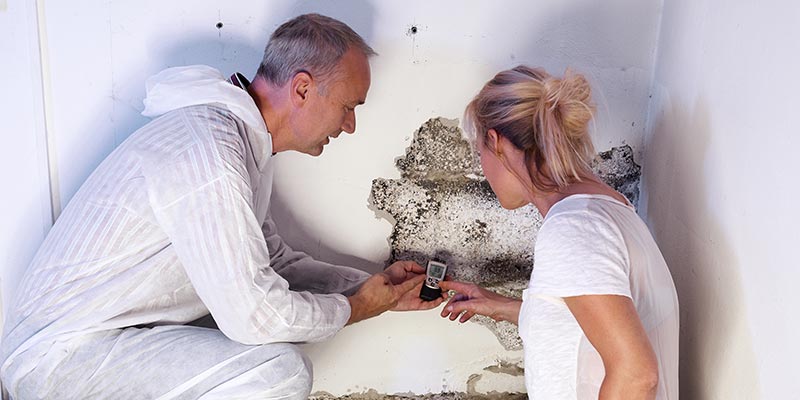Have Questions? Call: (416) 840-2680
REQUEST A QUOTE



If a group of 100 people are asked, “where’s the most humid place in your home?” Undoubtedly, a larger percentage of this group will mention their basement. Therefore, how to prevent basement humidity is one thing most homeowners should know, especially in the GTA, where most basements are attached to the house.
Whether your cellar is empty or used as a storage room, it can become a breeding place for mildew when the humidity is high. Not only is this annoying, but it can also cause health problems. Also, mould can damage any valuables you have in the basement. Hence, you should understand how to prevent these moisture problems properly.

In the same vein, preventing basement humidity becomes important if you want to finish your basement. If you plan to turn your basement into a home office or an entertainment room, the humidity in the space has to be just right!
There are several factors that can cause humidity in your basement. It may be from rain and groundwater or condensed outside air. However, these problems can easily be fixed with a systematic approach. It’s a lot to manage but the results are well worth it. This article briefly explains the causes of humidity in your basement and how to prevent it.
The main cause of humidity in your basement is poor insulation. Listed below are some other possible factors that can cause dampness:
As a result of poor grading, rain and groundwater may enter your basement. The soil around your house should tilt away from it. If it bends towards it, water will build up against your foundation and will eventually seep into your basement.
This usually occurs when the ground around your foundation isn’t adequately compacted. In the same vein, the more the soil settles, the more water flows towards your home than away from it.
It’s possible that your concrete block foundation develops cracks in it. If this happens, there’s every chance water will find its way into your basement. This can be dangerous to your basement finishing project.
These cracks can worsen if your floor jolts are not correctly attached to the foundation wall because it will let your walls move. Therefore, forming an aperture in them. Again, places where your walls meet rigid layouts like the fireplace, are also likely to crack.
Having a good drain tile is a helpful tip on how to prevent basement humidity. Most homes in Canada have no subsurface drainage system. This is because people never intended to use the basement as a habitable place. Hence, they didn’t see the need for an under-floor drainage system.
However, with basement finishing in the picture, there’s now a need for a better drainage system. Without it, there is a higher chance that you’ll have to deal with basement humidity.
Houses that have no drainage system for the basement area often encounter issues with their system. These issues may range from a broken sump, clogged pipe or pipe slits. Sump pits usually have a pump constructed to hoist the water to the soil surface outside the wall's foundation. If this fails, water will seep into your space.
If your gutters and downspouts channel water away from your home, then how to dry up your basement will not be a priority. However, if your downspouts and gutters are defective, rainwater will always find its way into your house foundation.
This rainwater will build up in the ground around it. Undoubtedly, when water accumulates around your concrete, there’s every possibility it’ll seep into the basement. Besides, it’s better to have a downspout without a splash block than to have none at all.
When you know how to prevent humidity in your basement, you’ll be saving yourself the stress and the cost of finding a solution to moisture problems.
Moreover, the tips for preventing basement humidity are simple approaches we often ignore. Below, we’ll address how to control humidity in your basement quickly.
We all know that the leading cause of internal moisture is water. Thus, ensure you check your home for leaky fixtures, pipes and toilets. A leakage from a pipe will most likely drip down to your basement and leave wet spots. If you have any leaky plumbing in your space, fix it immediately or call a professional plumber to patch it up.
To check for leaks, inspect the water meter reading, then turn off your water for an hour. After an hour, check back. If you notice a change in your water meter reading, then there’s a leak you can’t see. You can simply rectify this issue by changing your plumbing pipes. This will reduce basement moisture and prevent the fixtures from freezing in winter.
This is an excellent tip on how to prevent basement humidity. Many people probably lock the windows of their basements because it’s used as a storage room. However, increasing the fresh air in your basement will make it difficult for moisture to form.
This can be achieved by opening the windows on days with a cool temperature. Also, you can turn on the fans and use exhaust vents to improve the airflow. Given that you don’t leave your windows open on cold nights and humid days, your basement will be comfortable and dry.
The dehumidifier is an effective solution on how to prevent basement humidity. They’re the first remedy that comes to mind when tackling interior moisture problems. Dehumidifiers are available in several sizes and shapes.
Plus, they’re used to remove atmospheric moisture in any space by condensing it into water. Although it’s not ideal to use them every time, they can help you prevent excess humidity.
Therefore, position the dehumidifier in places where humidity is likely to occur and switch it on. You may either need a refrigerant or desiccant dehumidifier depending on your basement finishing project and the size of your space.
The refrigerant dehumidifier is ideal for most homeowners because it’s quieter and uses less power to work. Also, ensure you check your dehumidifier reservoir regularly. This will help make sure it works just fine.
How do you prevent basement humidity without monitoring the humidity level with a real device? A hygrometer is available at several hardware and home shops. It allows you to measure the humidity in a finished basement.
You can easily install this tool and make your home smart. With only a few taps on your mobile device, you’ll be able to stay updated on your house's humidity level.
The suitable humidity rate for a basement is less than 50 percent. Any percentage more than 80% is a pointer you’re having moisture issues. At this percentage, your home will already become a breeding site for mildews and moulds. The acquisition of a smart hygrometer comes with an insurance policy for homeowners.
Another tip for preventing basement humidity is by insulating your foundation walls. Insulation enables you to make the cold surfaces of your basement warmer. It simply builds a thermal boundary between the cool walls and the warm air. With this, your wall will be warmer, and moisture won’t condense on it. You can seal your walls with either standard batt or rigid insulation.
The most significant places to insulate are the rim joists and mudsills. These are the wood framing that is designed above the masonry foundation of basement walls. Similarly, ensure you only insulate the outside walls after fixing the leaks and cracks where water is seeping through. Otherwise, you’ll cover the damp walls with the insulation, and this will cause more mould.
When learning how to prevent basement humidity, you should know that moisture condenses on porous surfaces. Many housing materials, like stone and concrete, are porous. This means liquid can enter your cellar through the walls and foundation.
However, you can prevent this by coating your wall with several products that’ll make it waterproof. The good thing about these products is, they can be used like paint. You can use coatings like Drylok and Xypex.
If you plan to have a dryer in your finished basement, this tip is for you . The dryer’s duct carries warm and cold air in your home. If it has leaks, the moisture will condense in your basement, increasing the humidity in the space. Therefore, ensure the vent is completely sealed.
To reduce basement humidity, it’s best to use a strong metal duct for your dryer’s vent. Also,, ensure the duct is short and leads outside. If you find a leak in your duct, contact an HVAC professional for repair and inspection.
As mentioned earlier, a crack in your wall will let moisture pass into your basement. Hence, make sure you check your walls for cracks and holes. The little holes in the wall can be fixed with polyurethane masonry caulk. However, for bigger gaps, use hydraulic cement for coverage.
It’s easier to repair a hole that runs vertically. Any crack that is diagonal, growing or horizontal is better addressed by a basement finishing contractor in the GTA. You don’t want to widen the crack if you’re unsure about the issue.
The situation doesn’t have to be terrible before you learn how to prevent basement humidity. Ideally, both finished and unfinished basements should be above the average relative humidity level of 50%. Over the course of this article, we have discussed practical tips that will put you two steps ahead of humidity in your basement.
If you notice any effects of humidity in your basement, the best thing you can do is reach out to an expert. For this, our basement finishing and renovation services can help. Here at Basement Bro, we offer reliable and professional renovation services for all types of homes and basements. To keep your basement in a favourable condition, contact us today!